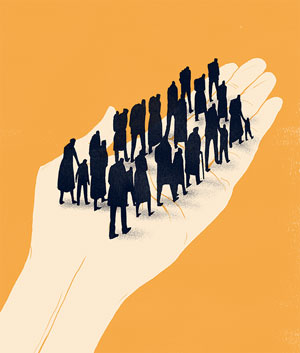Being Jewish
Commentary
Refugees and Moral Jewish Geography

How should Jews be thinking about the Syrian refugee crisis? Let us start with this: Today’s Jews are the children, grandchildren and (multiple times) great-grandchildren of refugees.
The Torah is the story of a refugee people. Abraham and Sarah fled from Ur, in modern-day Iraq, and then again from Haran on their journey to the Land of Israel.
Jacob fled from the murderous wrath of his brother, Esau, back to Haran or, as it is sometimes called, Aram Naharaim. From there, he fled from his uncle and father-in-law, Laban, back to the Land of Israel. From there, he fled from famine down to Egypt. Joseph’s brothers sold him into slavery; years later, at a time of famine, Joseph’s brothers and father, Jacob, came down to Egypt.
Moses fled from Egypt—the first Israelite to get out of Egypt. He, also, was a refugee.
In biblical times, how did you know that you were a Jew? Each year, the Israelites had to bring their first fruits to the altar and declare: “My father was a fugitive Aramean. He went down to Egypt with meager numbers and sojourned there; but there he became a great, mighty and populous nation. And the Egyptians dealt harshly with us and oppressed us with hard bondage” (Deuteronomy 26: 5-6).
If you could recite that proclamation, which forms the core of the Pesah Haggada narration, you were a Jew. To be a Jew is to name your past and to remember that you came from a people of refugees.
That is why Jews have historically had such sensitivity to the plight of refugees. It is that historical imperative that gave birth to, and continues to animate, the work of Jewish organizations such as HIAS, which has aided both Jews and non-Jews.
Jews should look at the refugees from Syria and play a game of moral Jewish geography.
Aram Naharaim, the place of refuge for the patriarchs, was in northern Mesopotamia—pretty close to modern-day Syria. Today’s refugees fleeing to Europe are our mirror images. Our ancestors fled from Europe—Spain, Germany, Russia. We should be looking at the refugees braving the waves of the Mediterranean and we should think about how the waters of the Sea of Reeds (or Red Sea) parted for us, but the waters of the Mediterranean do not part for them.
We should be looking at the grimly iconic photograph of the dead Syrian child on the beach in Turkey and we should be seeing, in our minds’ eyes, our own dead children in Europe. That is how we should feel, as Jews, about the Syrian refugee crisis.
But it is difficult, even presumptuous, to transform those feelings into what we think Europe should be doing about this crisis. First of all, not all of the refugees flooding Europe are from Syria. Many are from other Muslim countries. And many are not, in fact, impoverished.
Some who oppose such massive waves of immigration (for example, at one point, 12,000 a day into Austria) are, in fact, haters and bigots. But, it is legitimate for Europeans to ask themselves: How do we absorb immigrants whose basic worldview—anti-democratic, anti-gay, anti-women, anti-Zionist—is anathema to how we moderns imagine ourselves?
As for the United States, which has always thrived on diversity, American Jews should lead the way in helping our communities think deeply about how to best aid the (much fewer) refugees who have wound up in our midst. To do so is to exemplify the Torah’s oft-repeated injunction that we take care of the strangers in our midst.
As Jews, we can do no less.
Rabbi Jeffrey K. Salkin leads Temple Solel in Hollywood, Florida. His blog is Martini Judaism: For Those Who Want To Be Shaken & Stirred.










 Facebook
Facebook Instagram
Instagram Twitter
Twitter
Viviana Grosz says
It is commendable to promote Jewish values such as, in this case, helping refugees. However, since the needs of the world refugees fleeing oppression exceed the Jewish organizations capabilities to assist, what are the priorities to decide who and how to help?
Apparently, some Jewish organizations are focusing on the now very publicized Syrian refugee situation. It is important to remember that these refugees are overwhelmingly Syrian Sunni Muslims who have been raised to support anti American, anti Israel and anti Jewish sentiment. One should question whether these people seeking safety in the West will add overtime to the growing anti Semitic and anti Israel problem we are already witnessing here.
Jewish organizations should continue with the tradition of helping the oppressed, but as Jews our first responsibility is to help those who share Jewish values.
Mahalia says
Why does this have to be the ONLY rebilale source? Oh well, gj!